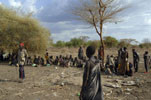
In the midst of increasing violence throughout Sudan’s South, Archbishop Daniel Deng has emerged to say that some of the attacks are not from cattle raids as reported, but are well-organized killings instigated by those who want to derail the Sudan peace process. The archbishop said the insecurity caused by the violence may ultimately sabotage promises of national elections next year and a Southern independence referendum in 2011. “It is a way of telling the people, ‘Well, there is insecurity in the country, so we can not go for elections,’” he told Voice of America.
The archbishop’s account dovetails with a disquieting trend Enough has noted in the recent wave of violence that, by U.N. estimates, has taken more than 2,000 lives and displaced 250,000 people. In nearly all the reports of violence in the South, the militias responsible appear to be organized and to have intentions beyond the cattle raiding that occurs each year. In this weekend’s attack in Jonglei, the militias were carrying new machine guns and wearing new uniforms. Pointing to this same raid, Archbishop Deng said that the militias ignored the cattle and went straight to the town. In general, the spate of killings this year has been on a larger and more violent scale than what normally results from cattle raids. What has been especially distinct is the unprecedented number of women and children, in the hundreds, who have been casualties of the violence. The archbishop’s account is significant at a time when details about the attacks are difficult to come by.
Although no evidence has arisen that clearly identifies who Archbishop Deng called “enemies of Sudan’s peace agreement,” the Sudanese government is a likely candidate. Not only does the government have a history of arming proxy forces to consolidate its power, it is within the National Congress Party’s interests to sabotage the approaching national elections and the South’s self-determination referendum by making the southern government appear weak and incapable of protecting its citizens. The pressure on the SPLM is already being felt—one U.N. official in South Sudan, as cited by VOA, has accused the southern government of not doing enough to disarm the militias. In response, the southern government has accused the NCP of arming the militias. Just today, Ezekiel Lol Gatkouth, head of southern Sudan’s mission to the U.S., accused the SPLM-DC, an offshoot of the main political party in the South, of being financially supported by the NCP.
Of course, there is not one single cause for the sharp uptick in violence throughout southern Sudan this year. Before the SPLM became the ruling party of southern Sudan, its military wing, the SPLA, also employed the strategy of arming proxies. Despite the CPA’s call for the dissolution of all armed groups outside of the North’s Sudan Armed Forces and the South’s SPLA, there is clear evidence from a number of sources (see this Small Arms Survey report for one) showing that militia groups linked to both the northern and southern Sudanese governments remain active. Historic tensions between the Nuer and Dinka tribes and the frustrations of southern Sudanese with SPLA security abuses and SPLM corruption may also be factors.
Photo: Southern Sudanese driven from their homes by an attack in Jonglei in March await food rations from WFP. (From U.N. via AP/Tim McKulka)

